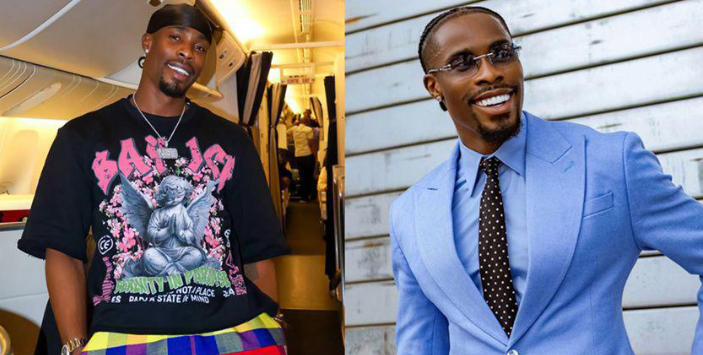
“I Will Kneel With a Big Smile” – BBNaija’s Neo Akpofure Wades Into Proposal Debate With Bold Declaration

The conversation around marriage proposals in Nigeria has once again taken center stage, and this time it’s courtesy of a viral remark from reality TV star and former Big Brother Naija housemate, Neo Akpofure. Known for his vibrant personality and unfiltered takes, Neo decided to share his stance on the long-standing cultural and social debate over whether a man should kneel when proposing to a woman. His words, delivered with characteristic flair, have since set social media abuzz, fueling fresh rounds of arguments and emotional reactions.
The issue began after several viral clips circulated showing men proposing without kneeling, sparking mixed reactions across platforms. While some argue that kneeling is an unnecessary Western import that has no cultural bearing, others insist it is an important gesture of respect, love, and humility in a relationship. Caught in this whirlwind of opinions, Neo Akpofure, popularly known as NeoEnergy, decided not only to weigh in but to do so with emphatic conviction. In a post that immediately caught attention, he declared: “If you like don’t kneel to ask your woman to marry you, that’s for you. Me, I will kneel with happiness and a big smile on my face, and if that bothers you I pray you don’t heal from that headache it causes you.”
The blunt but cheerful statement has become a rallying cry for many who believe that marriage proposals should be about love and choice rather than pride and ego. Neo’s comment was laced with both affirmation and defiance, leaving no room for ambiguity. He essentially signaled that for him, kneeling is not a matter of weakness or subservience but rather an act of joy, honor, and personal conviction. For someone with his growing influence among young Nigerians, his stance carried enough weight to spark debates far beyond the entertainment circles.
On X (formerly Twitter), Neo’s post generated thousands of engagements within hours. Supporters flooded his mentions, praising him for taking a stand that celebrates humility and emotional expression. “This is what real men do. Love is not about ego, it’s about making your partner feel cherished,” one user wrote. Another fan added, “Neo has spoken my mind. Kneeling doesn’t make you less of a man; it makes you human.” Many women also echoed the sentiment, saying they would feel more appreciated if their partners knelt during a proposal, describing it as a beautiful symbol of honor and commitment.
However, as is often the case with public discourse in Nigeria, not everyone was on the same page. Critics accused Neo of pandering to Western ideals, with some insisting that kneeling was never part of traditional African customs. They argued that proposals in African cultures were historically family-centered negotiations and not romanticized acts involving rings, flowers, or kneeling. “Neo should not let imported traditions confuse him,” one critic tweeted. “Our fathers never knelt to propose, yet they had lasting marriages. What we need is commitment, not theatrics.”
This back-and-forth reflects a larger societal tension in Nigeria where modern romantic ideals often clash with cultural traditions. For many, kneeling has become more than just a physical gesture—it symbolizes the ongoing tug-of-war between embracing globalized expressions of love and holding firmly to indigenous values. Neo’s confident declaration has therefore touched a nerve, reigniting questions about masculinity, respect, and cultural authenticity in modern relationships.
For those who follow his journey, Neo’s stance is not entirely surprising. Since his rise to fame in the BBNaija “Lockdown” season, he has carved out an image as someone who is unapologetically expressive about love, loyalty, and partnership. During his time in the house, he was often celebrated for how passionately he treated his then-partner, earning him admiration as one of the more emotionally attuned male housemates. His recent statement seems consistent with his long-standing openness to displaying affection without fear of judgment.
Some social commentators have also highlighted that Neo’s position is a refreshing counter-narrative in a time when public conversations about gender roles are often laced with toxic bravado. They argue that men like Neo, who proudly embrace vulnerability in love, help reshape societal expectations around masculinity. By declaring that he would kneel with a “big smile,” he not only normalized the gesture but also challenged other men to reconsider why they view such expressions as demeaning.
Interestingly, Neo’s remark also comes amid recent viral stories of men refusing to kneel during proposals, sparking heated reactions from their partners and onlookers. In one widely discussed incident, a man who refused to kneel faced ridicule after his proposal video surfaced online, with many labeling him “too proud.” Another story gained traction when the same man later retrieved a car gift he had given his fiancée after she rejected his proposal. Against this backdrop, Neo’s bold declaration feels even more timely, offering a perspective that flips the script and celebrates joy over ego.
Beyond the noise of social media reactions, what Neo’s statement truly underscores is the deeply personal nature of love. For him, kneeling is not about conforming to anyone’s expectations but about expressing genuine happiness and devotion. His words serve as a reminder that relationships are unique, and what matters most is the intention behind the action, not the action itself. Whether one chooses to kneel, stand, or simply hold hands during a proposal, the essence lies in sincerity and love.
As the conversation continues to trend, Neo Akpofure has once again proven that his voice carries weight in shaping contemporary social debates. By turning what some see as a trivial matter into a larger statement about love, respect, and authenticity, he has stirred a dialogue that cuts across gender, tradition, and generational divides. While opinions remain sharply split, one thing is clear: his unapologetic approach has inspired many to reflect on what love means to them and how they choose to express it.
In the end, whether kneeling to propose is labeled a Western tradition, a romantic gesture, or a cultural misfit, Neo’s stance has redefined it in the eyes of his supporters. For him, it is not a performance but a celebration—an act done with happiness, pride, and a big smile. And in a world where expressions of love are increasingly policed by societal expectations, his words resonate as a bold declaration of personal freedom. As one social media user aptly put it in response: “If love makes you smile, kneel. If pride makes you stiff, stand. At the end of the day, happiness is what counts.”
With this latest statement, Neo Akpofure has once again found himself at the center of a national conversation, proving that sometimes it only takes a simple declaration, delivered with honesty and passion, to remind society that love is ultimately about joy, humility, and choice. Whether one agrees with him or not, his message has left an imprint on the ever-evolving discourse about relationships, masculinity, and culture in Nigeria. And for those who share his sentiment, kneeling will never be seen as weakness, but as a powerful expression of love done with nothing but happiness and a big smile.


